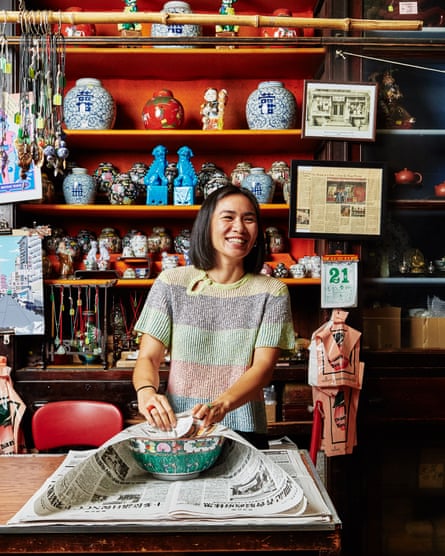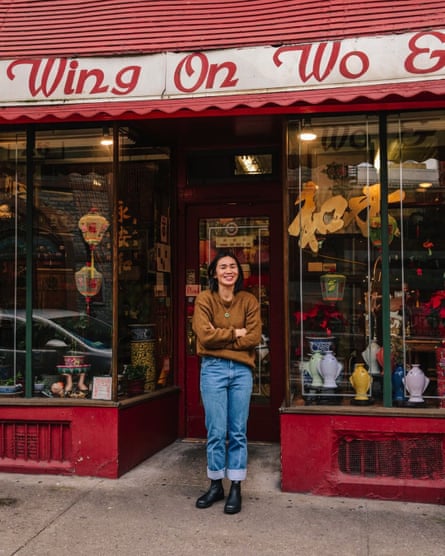FOr Mei Lum, the oldest business in Manhattan’s Chinatown, is both a symbol of community resilience and the informal living room in which she grew up. In the space behind Wing on Wo & Co’s modest red storefront on Mott Street, she dined with her family, took Chinese lessons with her grandparents and helped with the cashier as a child.
In 2016, the grandmother plans to sell the family-owned porcelain store and its building with a close estimate. $10 million Lum, who was going to study international relations at Columbia University, decided to take over the store – not only retain its cultural value, but Create a community hub. Her newly envisioned iteration of the family business would be a store and a club for activists and artists to tackle local issues such as gentrification and displacement, She said this would be exacerbated by the sale of the building to an outside developer.
“My desire to take over came from blurring the boundaries of the storefront,” said Lum, 32. “Businesses don’t have to be so economically driven. There can still be real connections, and that’s what sustains the community.”
As a fifth-generation owner, Lum’s eyes aren’t just for the future.she has been helping forever returns on wednesday Roots to the late 19th century.When it was a startup, the store In the era of the Chinese Exclusion Act, which restricted Chinese immigration to the U.S. and barred Chinese immigrants from obtaining U.S. citizenship, it served as a gathering place for impoverished Chinese workers, a credit union, and an informal post office.
More than 100 years later, Yonganhe is still the most important Family run. Lum’s father, Gary, has spent the past three decades working at the counter and chatting with customers. Her mother, Lorraine, handles orders and manages the website. Even her nine-year-old grandmother, Nancy, helps promote rare china on the store’s Instagram page, including hand-painted wine glasses, fish-shaped glazed vases and delicate dinner plates.
Pandemic forces Lum to surrender Enter e-commerce, digital marketing and social media. She has also added a number of new initiatives, including youth programmes, artist residencies and a pottery fair, to ensure that in addition to preserving traditions, business is Shaping the future of Chinatown.

Why did you decide to take over the shop instead of going to graduate school?
Merlin: The decision came out of a series of conversations about gentrification in America’s Chinatown and influenced her as she conducted research Interview different artists, activists, small business owners and other stakeholders in Chinatown.This provides me with context on how abandoning businesses and buildings may exacerbate certain gentrification cycles [are] What’s happening is to make sure my family can continue to have a space to gather and that my grandparents and aunts can grow old in place. I grew up coming here every day when I was a kid, helping me with cash, eating with my grandparents and taking Chinese classes. All of these memories helped me find myself and understand what it means to be Asian American.
What’s the biggest change you’ve seen this store go through?
brightness: The early Yonganhe was a grocery store selling canned and roasted meat. It is also a credit union and informal post office. When my grandmother took over in 1965, she decided to focus exclusively on porcelain. It was not until China opened up in the late 1970s (after the Cultural Revolution) that Yong An He had direct access to Chinese goods. Our heyday was the late 70’s to the late 80’s. A lot of our merchandise comes from Hong Kong where my grandfather grew up.
For more than a century, family-owned businesses like Wing On He have defined Chinatown. What is it like to run the store as a family?
brightness: We are a china shop, but it’s not just items in the store. It’s more about the memories they have, and the ritual that a teapot can inspire someone. We can go back to the original incarnation of Wing on Wo in the 1890s: a meeting place where people could tell stories and track each other.

What challenges has your family faced in the 21st century?
brightness: From the outside, Chinatown is a neighborhood with cheap food and cheap goods. In some ways, this is detrimental to us and the expectations of tourists when they come here. So it was very important to me to re-create our products and interpret the cultural heritage and delicate hand-painting of the porcelain we source.I would like to source directly from the ceramic studio in Jingdezhen (a city in southern China known as the world’s porcelain capital) So people can understand that we are supporting small artists. We do not source from big factories.
Wing on Wo is at a very interesting time where we’ve been reborn over the past seven years. The COVID-19 pandemic has prompted us to bring our entire store online, dabbling in e-commerce, digital marketing and social media. We see wholesale and large collaborations opening up a lot of opportunities for us, but we are struggling to grow due to external factors like inflation and supply chain issues.
How did you come up with WOhW Project, a grassroots art initiative to preserve Chinatown’s creative culture?
brightness: We see our store as a place to communicate with Asian Americans or the Asian diaspora, who make up the majority of our customer base today. They miss family history and traditions and are curious about their cultural identity. We want them to know who they are through our china or snuff bottles, or at our events. We host open mic nights, art exhibitions, youth internships and discussion groups discussing the use of art as a means of counteracting gentrification. We are focused on working with Asian, queer and trans youth because the future of Chinatown depends on future generations. We want to make sure they feel a sense of belonging and ownership of this community, and we want to give them the tools to honor the legacy of those who came before them.